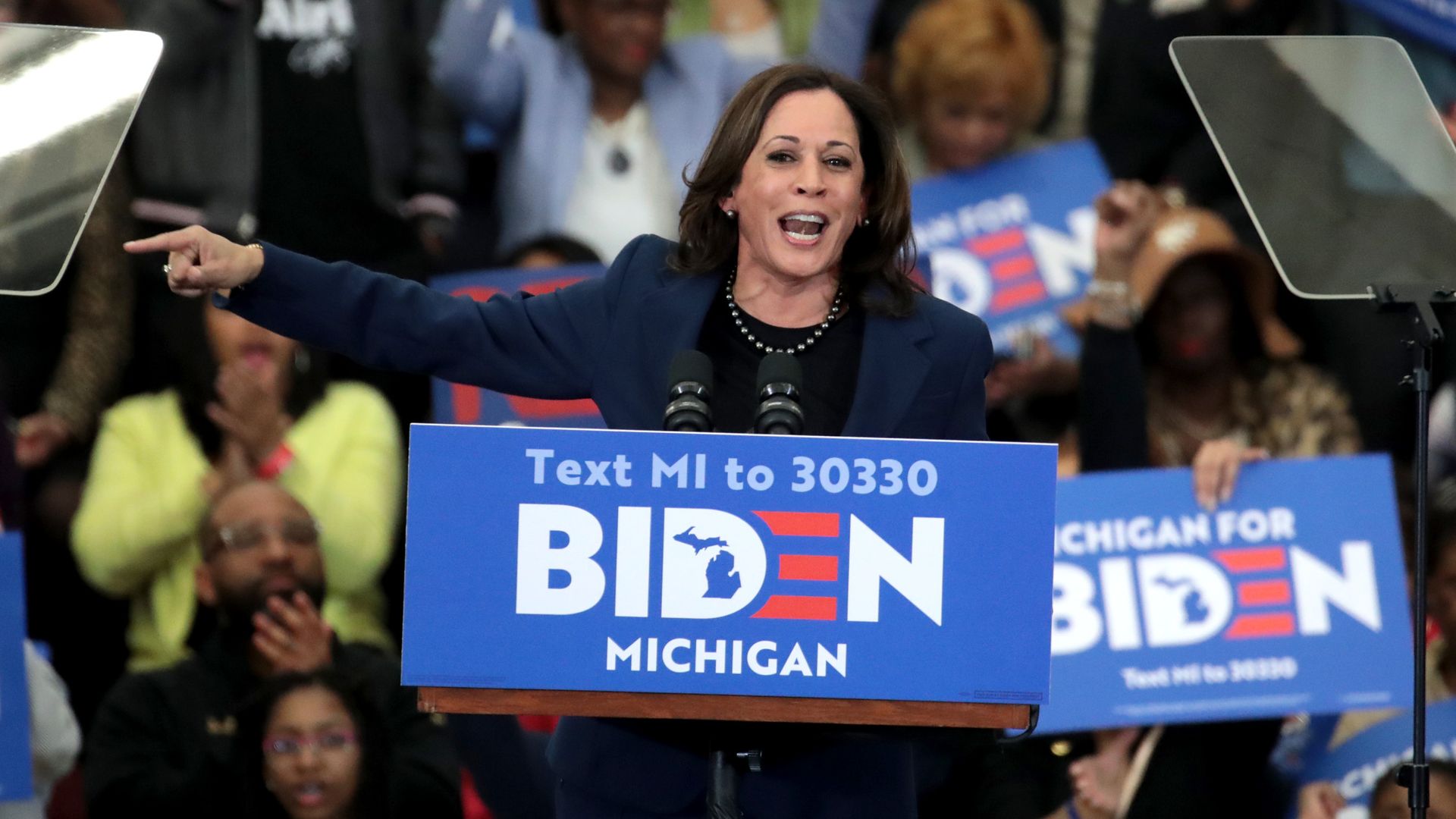Liberals Happy? Get the black lives matter and Indian American votes
https://www.axios.com/joe-biden-kam...ent-e2109284-944c-4053-b506-9735e261e3ff.html
Joe Biden picks Kamala Harris as running mate
https://www.axios.com/authors/newsdesk

Photo: Scott Olson/Getty Images
Joe Biden announced Tuesday that he has chosen Sen. Kamala Harris (D-Calif.) as his running mate — the first Black woman to be named to a major-party U.S. presidential ticket, and potentially the first woman vice president if Biden defeats President Trump.
The big picture: Harris was probably the safest choice Biden could have made among his running mate finalists. She has a national profile and experience with elected office, was vetted and tested in the Democratic presidential primaries and can boost Biden's fundraising.
https://www.axios.com/joe-biden-kam...ent-e2109284-944c-4053-b506-9735e261e3ff.html
Joe Biden picks Kamala Harris as running mate
https://www.axios.com/authors/newsdesk

Photo: Scott Olson/Getty Images
Joe Biden announced Tuesday that he has chosen Sen. Kamala Harris (D-Calif.) as his running mate — the first Black woman to be named to a major-party U.S. presidential ticket, and potentially the first woman vice president if Biden defeats President Trump.
The big picture: Harris was probably the safest choice Biden could have made among his running mate finalists. She has a national profile and experience with elected office, was vetted and tested in the Democratic presidential primaries and can boost Biden's fundraising.
- To get to the decision, Biden had to move past residual tensions and make peace with a fierce primary competitor.
- The decision elevates Harris among the next generation of Democratic leaders and could give her a big advantage in 2024, if Biden were elected and decided not to run for a second term.
- "I need someone who understands the pain that so many people in our nation are suffering. Whether they’ve lost their job, their business, a loved one to this virus. This president says he “doesn’t want to be distracted by it”. He doesn’t understand that taking care of the people of this nation -- all the people -- isn’t a distraction -- it’s the job. Kamala understands that."
- "I need someone who understands that we are in a battle for the soul of this nation. And that if we’re going to get through these crises -- we need to come together and unite for a better America. Kamala gets that."
- "I first met Kamala through my son Beau. They were both Attorneys General at the same time. He had enormous respect for her and her work. I thought a lot about that as I made this decision. There is no one’s opinion I valued more than Beau’s and I’m proud to have Kamala standing with me on this campaign."
- "Her record of accomplishment -- fighting tooth and nail for what’s right -- is why I’m choosing her. There is no door Kamala won’t knock on, no stone she’ll leave unturned, if it means making life better -- for the people."
- But some Democrats will be watching her political skills closely, after her presidential bid fizzled and a New York Times piece depicted a campaign full of bad decisions and backbiting.
- She has also faced public and private questions from some Democrats about whether she'd be too focused on running for the presidency again, although other Democratic operatives have said the questions about her ambitions have been sexist and inappropriate.
- She solidified her national profile when she grilled Trump administration nominees and administrators, including Brett Kavanaugh during his Supreme Court confirmation hearing in 2018.
- President Obama recognized her talent early on, in 2013 famously calling her "brilliant," "dedicated" and "tough."
- Harris dropped out of the race in December, saying she didn't have the funds to continue.
- In an October interview with "Axios on HBO," she explained her decision: "I heard from people, 'Kamala, don't take away my choice if I want a private plan. Please don't take away my choice.' And I said, you know what? That is fair."
- "I said to my team, I know we're going to take a political hit for it. ... I knew I'd be called a flip flopper for that."
- She also said in that interview that "of course" it's different to run for president as a Black woman because in Americans' experience there is "not a reference point for who can do what, there is a lack of ability or a difficulty in imagining that someone who we have never seen can do a job that has been done, you know, forty-five times by someone who is not that person."
- She defended the death penalty as attorney general, despite being personally against it.
- She didn't take a position on Proposition 47, approved by voters, that reduced some felonies to misdemeanors.
- She opposed a bill that would have required her office to investigate police shootings.
- It will be also be relevant to her own political future.
- Harris will join Vice President Mike Pence on Oct. 7 in Salt Lake City, Utah, for the first vice presidential debate of the 2020 cycle.





